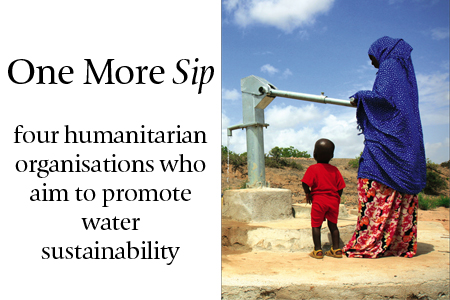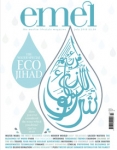
One More Sip
Issue 70 July 2010
More than 1.1 billion people have no access to clean water. Zahra Khimji presents four humanitarian organisations whose projects aim to promote water sustainability.
As the saying goes, it’s important to see the glass as half full. Given the environmental and economic pressures facing the world today, reaching for a glass of water or over-fishing the world’s waters is a test of will. Quite simply, it is easy to leave the glass half empty. Nonetheless, various organisations are working hard to carry out projects that conserve water and protect the environment. The key concern is to provide a sustainable resource that will supply water to millions around the year and protect our seas. Glasses up!
Oxfam’s ‘borehole project’ in the Harshin district of Ethiopia will benefit approximately 54,000 people and 360,000 livestock. Following the 2008 severe drought, the government called on Oxfam’s help to drill a borehole to support their goal of providing sustainable water resources for the Ethiopian people. The project’s plan specifically includes drilling a 300 metre borehole and constructing an enclosed structure from which the local people can access the water. Apart from accessibility of water, Oxfam is planning to form a committee that will over-look the sustainable use of this borehole. The committee’s management will be trained to liaise with the district government. Apart from water accessibility, the aims of Oxfam and the Ethiopian government include reducing the workload for women who are generally required to walk long distances to obtain dirty water as well as create a greater awareness of hygiene and public health.
Islamic Relief’s ‘Water for Life’ project targets Kenyans in the Mandera region. Approximately 75,000 people and 250,000 livestock have benefited from the water facilities Islamic Relief has provided. The project aims to bring water from under the ground in five different areas of Mandera. At each of the five sites, a water storage tank, power house and four water kiosks have been set up. The greater accessibility to water has decreased the distance Kenyans have to travel to receive water. The nearest water supply is 150 metres, a significant decrease from the two kilometres it used to be. As a result, more children are attending schools given that they no longer have to search for water in distant places. Parents and guardians can also now focus on their children’s needs. More importantly, inter-clan conflict has decreased as no one has to fight over access to water.
The Islamic Foundation for Ecology and Environmental Sciences’ intensive Islamic educational programme to educate fishermen in Zanzibar has won much praise. The project to halt over-fishing and dynamite fishing in the Misali Island area has proved so successful that even HRH Prince Charles flagged it up in his talk on Islam and the environment. Misali Island is a beautiful island in the Zanzibar archipelago and contains coral that is home to 300 species. Due to economic pressure and fishing from international trawlers, local fishermen have been forced to dynamite coral reefs to get their catch. This practice weakens coral and kills off younger fish that play an important part in re-building fish stocks. IFEES tackled this problem by constructing a manual that uses lessons from the Qur’an to show how fishing resources can be protected and sustainably used. IFEES has managed to teach fishermen how to adopt sustainable fishing practices and still earn their living. Although this project is still on-going, IFEES continues to bring the local Misali community closer to Islamic teachings.
Families Relief’s ‘tube well’ scheme builds tube wells in rural areas and villages in an effort to provide the local community with a cleaner water source. One tube well can supply water to 1000 people and takes about 45 days to build. Given the sustainability of building tube wells, Families Relief involves local NGOs and communities to carry out the work. The community’s involvement adds to the sustainability of the project and has success in various parts of the world, including South Asia and West Africa. The benefits of the tube well include cleaner and safer water, an added benefit to a water resource. They also make accessibility easier; improving the lives of the local population that otherwise would have had to walk far distances to obtain dirty water. Women and children can then focus on improving other aspects of their lives.
Bookmark this |
|
Add to DIGG |
|
Add to del.icio.us |
|
Stumble this |
|
Share on Facebook |
|
Share this |
|
Send to a Friend |
|
Link to this |
|
Printer Friendly |
|
Print in plain text |
|


Comments
0 Comments